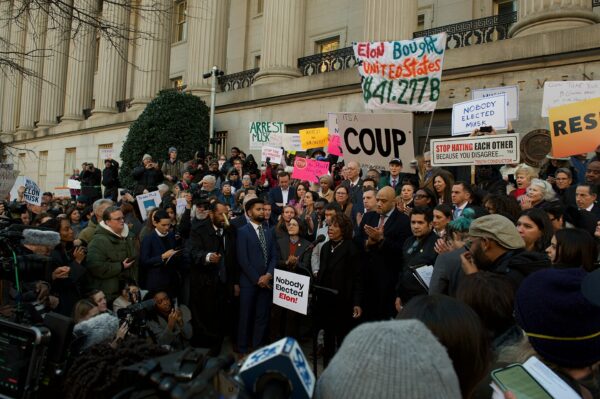Representative LaMonica McIver (D-NJ) is now reportedly expected to ask a federal court on Tuesday to dismiss charges brought against her stemming from an incident involving U.S. Immigration and Customs Enforcement (ICE) agents last May.
The New Jersey congresswoman faces allegations of assault for interfering with federal officers during the attempted arrest of Newark Mayor Ras Baraka (D).
The clash occurred at ICE’s Delaney Hall detention facility in Newark, where McIver and Baraka confronted federal agents as they sought to enter the secure facility.
According to court filings, Baraka was arrested for trespassing after entering a restricted area and refusing to leave when asked by agents.
McIver is accused of three counts of assaulting or impeding federal officers in the same incident, and her trial is currently scheduled to begin next month. Conviction could carry a sentence of up to 17 years in prison.
McIver’s attorneys plan to argue that the case represents selective and vindictive prosecution. “The filing will likely echo prior motions asserting that these charges were politically motivated,” her legal team noted, contending that the Trump administration unfairly targeted the congresswoman.
The defense has also already submitted a separate motion to dismiss on grounds of legislative immunity, claiming that McIver was acting in the scope of her official duties when confronting federal officers.
The case has drawn national attention because it involves both a sitting member of Congress and a city mayor, highlighting tensions between local officials and federal immigration authorities.
Critics argue that attempts by federal agents to enforce immigration law in Newark were met with obstruction by political figures. Supporters of McIver contend that her actions were a legitimate defense of constituents and a protest against aggressive federal enforcement.
“The question before the court is whether a sitting legislator can be criminally prosecuted for actions taken in the course of representing the public,” one legal analyst said, describing the defense’s legislative immunity claim as central to the case. McIver’s legal team asserts that any interference with federal agents was part of her official duty to ensure transparency and oversight of ICE operations in her district.
Federal prosecutors, however, maintain that the law is clear: attempts to impede or assault federal officers, regardless of political status, constitute a criminal offense. The outcome of McIver’s motion could significantly affect how federal authorities engage with elected officials in enforcement actions, particularly in cities with policies resistant to federal immigration enforcement.
The dispute underscores broader debates over the role of federal law enforcement in sanctuary jurisdictions and the limits of political protest. While McIver’s attorneys frame the case as an overreach, law enforcement officials view obstruction as a threat to officer safety and the rule of law.
As the court considers the motion, observers are closely watching the implications for both the New Jersey congresswoman and federal authority more broadly. McIver’s challenge represents a high-profile test of legislative immunity claims in the context of interactions with federal agents enforcing immigration law.
[READ MORE: Republicans Demand Probe After Speaker at Chicago Rally Urges Violence Against ICE]








